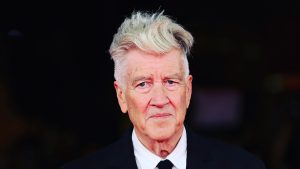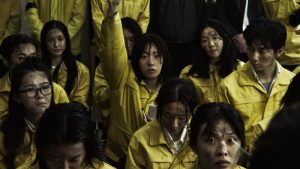
South Korean writer, director, and cinematographer Syeyoung Park may only be 28 years old, but he already has quite some filmmaking experience and is emerging as a genre auteur ready to make waves. At the 78th edition of the Locarno Film Festival in Switzerland, for example. His new feature, The Fin, world premieres in the fest’s Filmmakers of the Presence program on Saturday, Aug. 9.
If you think Squid Game was dystopian, check out the synopsis for this movie set in an imagined unified Korea. “In a post-war and ecologically devastated Korea, mutated outcasts called Omegas are exploited as cheap labor,” it reads. “Sujin, a young government worker, begins to doubt the state’s ideology as she pursues Mia, an Omega in hiding.”
Omegas are mutated humans with fins and fish-like feet, and their screams outside of water are said to be deadly. Oh yeah, their fins are also full of toxins, and when they die, Omegas release radiation, the government keeps reminding citizens. Omegas, exploited as the workforce to clean the oceans, face constant suppression and prosecution if they manage to cross The Great Wall.
“Set in a near-future Korea, The Fin explores the contagion of fear and the making of myths,” Park says in a director’s note. Indeed, fear and propaganda are everywhere. “The Great Wall. Our Pride. Our Guardian. Our Unified Korea,” goes one slogan featured in the movie. And Omegas, exploited as the workforce to clean the oceans, face constant suppression and prosecution if they manage to make it across the Wall.
Yeji Yeon (Pachinko) portrays Mia, an Omega who lives in disguise among humans and gets a visit from an escaped Omega who asks her to fulfil her dead father’s final wish. Mia works in an eerie store that taps into people’s nostalgia for the sea and fishing. Pureum Kim, a well-known Korean singer, plays Sujin, a newly recruited government worker who grew up with her mother’s strong anti-Omega sentiment and becomes suspicious of Mia. Goh-Woo, Youngdoo Jeong, and Joowon Meng are also part of the cast.
The original inspiration for The Fin came when Park’s grandmother died from COVID, and the family couldn’t go through the usual rites. “It made me think about what it means to lose someone,” the filmmaker recalls the first seed of an idea. “But then the story evolved from there.”

Courtesy of Syeyoung Park
His experience living near the Demilitarized Zone between North and South Korea also influenced the movie. “Seoul is expensive, and as a student, I had to move outside the city. But I’m not from a rich family, and things aren’t easy financially for students, so I found myself moving further and further North,” he explains. “And the border plays on your mind.”
The equivalent of the “border” in the movie is, yes, the Wall. The social divides that Park knows show up in the film as well, for example, in the form of some of the less fortunate people in the streets and the fish store.
And as if to underline any such points on the division of social classes, Park says that the fish store, in which key scenes for the film were shot, in a “neglected and derelict” area used for filming, was closed and torn down without much warning during the shooting process. Cue the montage of gentrification-centric construction footage!
Park previously made one feature of just more than 60 minutes, the 2022 movie The Fifth Thoracic Vertebra, which won three awards at the Bucheon Film Festival, a best director honor at the Seoul Independent Film Festival, and a special jury mention at Montreal’s Fantasia Film Festival. It is also a genre movie with dark themes. “A creature born in an abandoned mattress travels around the country feasting on its victims’ vertebrae, struggling to break free,” a synopsis for it reads.
The Fin is Park’s first full-length feature, so to speak, and the process to complete it lasted a while. “The editing process took three years, much longer than I had expected,” Park shares. The extended edit period, along with reshoots, meant that things in the real world changed during the work on the film, blurring the lines between fact and fiction. “Walls began going up and wars started, so the world became more dystopian,” Park highlights.

Courtesy of Syeyoung Park
I must ask the young filmmaker about his surely limited budget, and he shares that it amounted to less than 25,000 euros ($29,000) before Coproduction Office and Seesaw Pictures came on board and helped with further costs. Still, how does he make do with a limited budget without his audience noticing?! “I work for 11 months, shooting other people’s music videos and brand films,” he tells THR. “And the money I put aside, I then use to shoot my own work. I do my own cinematography and work with close collaborators who help me out.”
A lot of the people featured in his films, for example, are actually first-time actors and friends. But not all are. “I was the cinematographer for a short film where Pureum Kim was the leading actress,” Park explains. “This was five years ago. She came on board the film, and we’ve collaborated on her music videos as well during the process of completing The Fin.” And how did Yeji Yeon, who you may recognize from Pachinko, end up in a key role in The Fin? She went to the same university as Park, and one of his crew members knew her from film school. “She introduced us,” says Park casually.
His way of directing is to allow the people in front of the camera to act naturally as much as possible. “Because most of them are not trained actors, I like to capture scenes in a raw style,” rather than staging too much, he explains. “That makes it more authentic.” Because of his limited budget, Park says he chooses locations and then tends to shoot quite quickly, also adding to that sense of authenticity.
He also knows how to turn budget and crew restrictions into a creative visual advantage when it comes to lighting. “I often film underlit and then enhance the light in post-production,” Park tells THR. For The Fin, his team worked to make the dim light extra grainy, giving it a particularly sinister quality.
While finishing The Fin, Park made some shorts, such as The Masked Monster, which screened at Locarno last year and earned a special mention from the shorts jury. You can imagine that the synopsis for it is, again, quite dark. “Overcome with hunger, a girl trades her brother for a bag of rice,” it says. “When her hunger is sated, she comes to her senses. But it is too late.”

Courtesy of Syeyoung Park
Park shot another feature last year that he is editing right now and promises creepy feelings of a different kind. Its title: Who Stole My Cross?
“It’s based on a real-life experience,” the filmmaker tells THR. His father is a pastor, and Park’s church community realized at some point that a man whom they considered a friend was a cross thief, he explains. “We went to his place to confront him about this, but he had disappeared,” he recalls. “We found that there were hundreds of stolen crosses in his house. So there were all these questions: Who is this guy? And why did he steal so many crosses? I wanted to explore that in film form.”
#Korea #Wall #Pureum #Kim #Mutants






